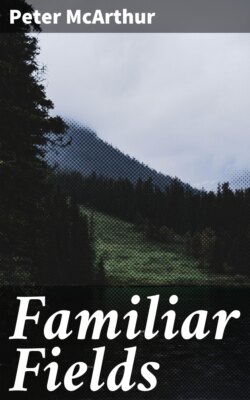Читать книгу Familiar Fields - Peter McArthur - Страница 7
На сайте Литреса книга снята с продажи.
GETTING OUT TO GRASS
ОглавлениеTable of Contents
Getting out to grass is certainly the event of the year for the animals on the farm. I know, because I have a strong fellow-feeling for them. When the sun begins to get warm, and the grass starts to grow, I get impatient for the time when I can fling myself at full length on the sod without being scolded for taking chances of catching cold. When the cows were allowed out for the first time, they could hardly wait to go through the gate before they started to graze, and for a couple of hours they kept at it as if their lives depended on getting a good meal. But presently something stampeded the young cattle, and the whole bunch began running, bunting one another, and jumping around as if indulging in a foolish sort of sun-dance to celebrate their freedom. When this was over, the red cow started on her annual inspection of the fences. The thorn hedge, woven with barbed wire, baffled her, as it did last year, and I thought everything was all right. The next time I looked she was in the clover field. The spring flood had loosened things around the Government drain. After driving her out I fixed this break in the fence, only to find that she was in the field again. She had found a place where the wire fence had been cut to haul out wood and had managed to push through. Turning her out again I made a thorough job of mending this, and that ended the trouble. She made a complete round of the field, stuck her head over every fence and bawled, but that was all. Now I can go about my work without giving a thought to the fences. The red cow and I examined and tested them thoroughly on the first day and fixed them for the summer. Really, the red cow is a great help. If it were not for her I might be bothered with fences all season, but one day is enough. She examines the fences thoroughly, and after she finds the weak spots I fix them up. If her calves take after her I shall be able to advertise a new strain of useful stock. No farmer should be without one of these fence-testing cows to help him keep his farm in shape and protect his crops.
For a few days everything was quiet in the pasture field, and then, all of a sudden, there was a tremendous noise. All the cattle began to bawl defiance. A big, slab-sided two-year-old steer began to lead the herd towards the line fence. He had his head down, his mouth open, and he walked catercorner, roaring like one of the bulls of Bashan. A neighbour had just turned out his cattle, and they were approaching the line fence, and putting up the same warlike bluff. I should have had more respect for the dehorned two-year-old and his war talk had it not been that on the previous evening I had seen him being prodded across the field by a sharp-horned little yearling heifer. He grunted and got out of her way like a fat man getting beyond the reach of a suffragette's elbow in a street-car rush. But he certainly did make an awful noise. I don't know why it is, but I always find something in the actions of cattle to remind me of politics. There is the same tendency to go in flocks, to make a wholly unnecessary amount of noise, and then to accomplish nothing. When the two roaring herds finally met at the line fence they merely stuck their noses through the wires and sniffed at one another for a few minutes, and then went back to pasture. The crisis was over.
When the driver got out for the first time she went through the gate on the run. She ate quietly for a couple of minutes, then lay down and had a most satisfactory roll. When she got up she took a look around the field, squealed, jumped into the air, and began to give an exhibition of energy that I didn't think was in her system. She must have had it in cold storage all winter, for she hadn't been using much of it on the road. She galloped, kicked, and snorted, and I sat down and tried to figure out whether she was snorting at the kick or kicking at the snort. But like many another problem I have tackled, it was too deep for me. There were times when she had all four feet in the air at once, and looked as if she could have kept four more going. She would gallop round in a circle, then come to a sudden stop and snort. When the echo of the snort came back from the woods, it would scare her so that she would start off on the gallop again. After she had relieved herself and galloped around the field in this way about a dozen times, she finally settled down and began to eat. After watching this exhibition I made up my mind that there will be more speed in my drives to the post office in the future. I thought she was troubled with "that tired feeling" that comes to all of us in the spring, but now I shall have no compunction about using the whip. She has simply been loafing on me.
